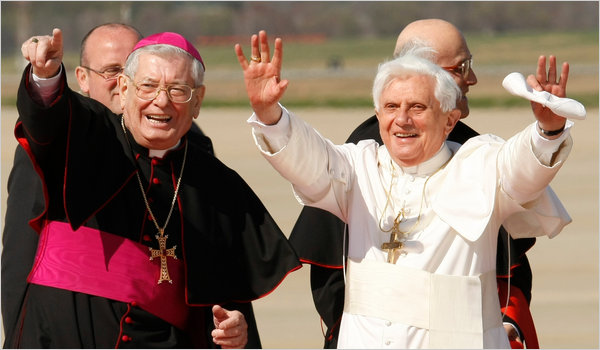By Paul Vitello
New York Times
July 29, 2011
http://www.nytimes.com/2011/07/29/world/europe/29sambi.html?_r=1
 |
| Archbishop Pietro Sambi, left, with Pope Benedict XVI in 2008. He served as the papal ambassador to the United States. |
Archbishop Pietro Sambi, a career Vatican diplomat who represented the Roman Catholic Church for more than four decades in diplomatically delicate postings around the globe and served as the papal ambassador to the United States since 2005, died on Wednesday in Baltimore. He was 73.
The cause was complications of lung surgery he underwent two weeks ago, Vatican Radio said.
Archbishop Sambi, a gregarious, silver-haired Italian priest fluent in English, French and Spanish, was one of Pope Benedict XVI’s first appointments after Benedict succeeded Pope John Paul II in 2005.
In 2008, when the new pope made his first trip to the United States, Archbishop Sambi became the point man in defending the pope’s controversial decision not to visit Boston, the nexus of the sexual abuse crisis among priests in the United States. Abuse victims and Cardinal Sean P. O’Malley of Boston were urging a visit, but church officials privately feared there was too much danger of public protests.
At the same time, Archbishop Sambi helped arrange a private meeting between a select group of victims and the pope at the official papal ambassador’s residence in Washington a few days before the end of his trip. One victim at the meeting was said to have told the pope that he needed to do more about the “cancer in your flock.”
Jason Berry, an author who was one of the first journalists to report on sexual abuse in the church, said Archbishop Sambi’s sensitivity to the needs of ordinary people had made him a rare Vatican prelate. In his recent book on church finances, “Render Unto Rome,” Mr. Berry portrayed the archbishop as one of the few high-ranking church officials in the United States who had tried to stop dioceses from closing parishes to pay for sexual abuse court settlements.
But Terence McKiernan, president of BishopAccountability.org, which archives documents from the abuse scandal, said that in recent years Archbishop Sambi had lobbied the Vatican behind the scenes to appoint a number of bishops whom the group considers hostile to victims’ rights.
In a statement, Archbishop Timothy M. Dolan of New York, the president of the United States Conference of Catholic Bishops, said Archbishop Sambi had possessed both “a keen sense of diplomacy cultivated through many years of service in the Vatican diplomatic corps, especially in Israel, and a pastoral sensitivity cultivated through his many years as a faithful and devoted priest.”
Pietro Sambi was born on June 27, 1938, in Sogliano al Rubicone, in central Italy. His father was a schoolteacher. After he was ordained a priest in 1964, he studied theology and canon law in Rome and joined the Vatican diplomatic service in 1969. He served in Cameroon, Cuba and Algeria before his appointment as papal nuncio to Nicaragua in 1979, soon after the overthrow of the repressive government of Anastasio Somoza and the installation of the leftist Sandinista government led by Daniel Ortega.
Ambassador Sambi was often cast as a mediator between the many Catholic priests who held prominent offices in the Sandinista government and the Catholic bishops of Nicaragua, who opposed the priests’ participation in the apparatus of a socialist state.
He became an archbishop in 1985 and served for the next dozen years in Burundi and Indonesia.
Archbishop Sambi became Vatican ambassador to Israel and apostolic delegate to Jerusalem in 1998. He was deeply involved in arranging Pope John Paul II’s historic 2000 visit to Jerusalem, the first time any pope had visited the Western Wall and the Yad Vashem Holocaust Museum.
In 2007, when he was already ambassador to the United States, he stirred controversy with remarks in which he accused Israel of dragging its feet in carrying out a 1993 treaty with the Vatican over church properties and the treatment of Catholic Arabs in Jerusalem. The Vatican distanced itself from his comments.
Any original material on these pages is copyright © BishopAccountability.org 2004. Reproduce freely with attribution.